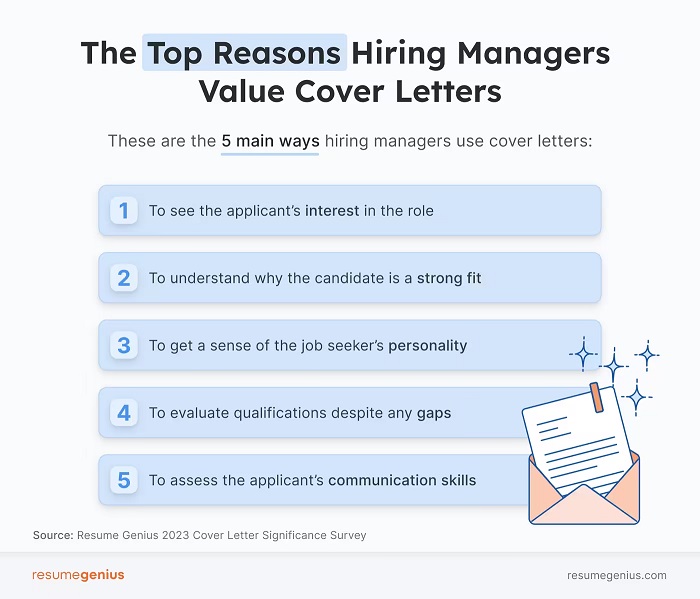In today’s job market, competition is fierce, and making a strong impression is essential. A well-written cover letter can set you apart from 98% of candidates who skip this step, giving you a significant advantage.
Why Cover Letters Matter
- Stand Out from the Competition: Only 2% of applicants submit compelling cover letters, making this a valuable opportunity to shine.
- Increase Your Visibility: 83% of hiring managers read cover letters, which means including one can get your application noticed.
- Showcase More Than Just a Resume: A cover letter adds personality and context that a resume alone cannot convey.
- Gain a Competitive Edge: A well-crafted letter makes your application 38% more visible to recruiters.
- Demonstrate Effort and Interest: 72% of recruiters expect candidates to submit cover letters, even when not required.
- Explain Career Changes or Gaps: This is your chance to clarify job transitions or employment gaps.
Addressing Employment Gaps Effectively
Recruiters appreciate transparency when reviewing applications. If you have gaps in your employment history, use your cover letter to explain them positively. Whether you took time off for personal development, further education, or caregiving responsibilities, framing it as a period of growth can reassure employers about your readiness for the role. Focus on the skills and experiences gained during this time and how they contribute to your qualifications.
Crafting a tailored cover letter doesn’t have to be time-consuming. AI-powered tools like CoverLetterGenerator.ai (read article about AI-powered tool) can help you create a polished, personalised letter in minutes.
Common Cover Letter Mistakes to Avoid
Even the best-intentioned cover letters can contain errors that hurt your chances. Some common mistakes include:
- Being Too Generic: Hiring managers can spot a template cover letter instantly. Personalization is key.
- Repeating Your Resume: Instead of summarizing your CV, use the cover letter to highlight specific achievements.
- Being Too Lengthy: Keep your cover letter concise—ideally one page—to maintain the reader’s attention.
- Ignoring Keywords: Many companies use applicant tracking systems (ATS) to filter applications. Incorporating relevant keywords from the job description can improve your chances of passing these systems.
How to Make Your Cover Letter Effective
- Tailor It to the Job: A generic cover letter won’t impress—customise it for each position.
- Highlight Your Strengths: Focus on how your skills and experience match the job description.
- Express Enthusiasm: A passionate, well-written letter can make a lasting impression.
Structuring Your Cover Letter for Maximum Impact
To create a compelling and easy-to-read cover letter, follow this structure:
- Introduction: Mention the job you’re applying for and briefly explain why you’re excited about the opportunity.
- Body Paragraphs: Highlight relevant experience and skills that align with the job description. Provide specific examples to back up your claims.
- Closing Statement: Reiterate your enthusiasm, express appreciation for the hiring manager’s time, and include a call to action, such as requesting an interview or expressing interest in discussing the role further.
By structuring your cover letter effectively, you ensure that hiring managers quickly grasp why you’re the perfect fit for the role.
With nearly half of hiring managers spending just 30 seconds to two minutes reviewing cover letters, every word matters. Instead of mass-applying without one, take the time to craft a strong, targeted cover letter and increase your chances of success. Join the top 2% of candidates and stand out in today’s competitive job market.












